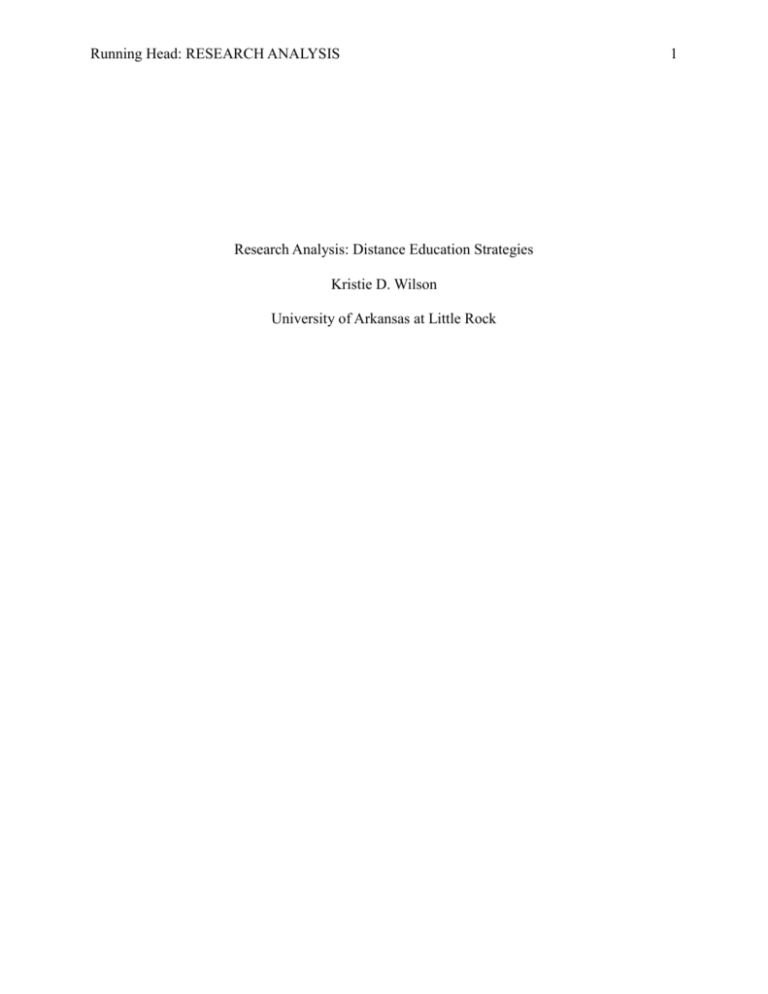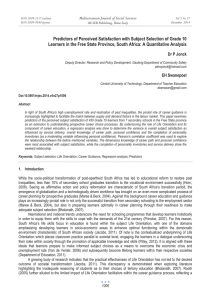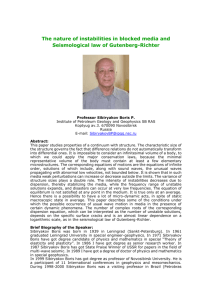Research Analysis: Distance Education Strategies
advertisement

Running Head: RESEARCH ANALYSIS Research Analysis: Distance Education Strategies Kristie D. Wilson University of Arkansas at Little Rock 1 RESEARCH ANALYSIS 2 Research Analysis: Distance Education Strategies Distance learning is a growing trend in today’s society. Schools are striving to meet the constant changing lifestyles of students through asynchronous learning. Is there a certain type of population who take web-based distance courses versus traditional face-to-face classroom courses? Do students’ personality types as well as their learning style and motivation affect their perceptions and success in distance learning courses? Design elements of online courses may vary. What elements are preferred by students and make web-based instruction more efficient? In a journal article by Cathy Bishop-Clark, Beth Dietz-Uhler, and Amy Fisher of Miami University, a study was conducted on the influence of personality factors on student success and satisfaction in an online course. There were 29 students who participated in this study. First, their personality type was determined by a survey that was measured by the Myers Briggs Type Indicator. Two separate class sections were a part of this study, one offered in the summer term, the other offered in the fall term. Performance was measured in electronic communications, quizzes, tests, and class projects. The basis of emotional cognition was based upon dimensions which include: Extravert/Introvert, sensing/intuiting, thinking/feeling, and judging/perceiving. A survey at the end of the term was used to measure satisfaction ratings among students. Despite a few differences, the overall findings were that personality factors did not influence student success, as it did influence student satisfaction. The majority of research comparing Web-based distance learning with traditional forms of learning report ‘no significant difference’ and distant learners achieve as well as local learners (Clark, Uhler, Fisher, 2007). Is there a correlation between personality type and learning style? A further investigation covering the relationship with learning style and personality type would assist in offering a fair educational program for each ‘type’ of student. RESEARCH ANALYSIS 3 Marcy Reisetter and Greg Boris conducted a study using an extensive survey they created based on their own experiences as teachers and review of literature. They wanted to know who takes online courses and why, as well as find out what the most important elements among these classes are for student success and satisfaction, such as course design, course components, resources, and competence of teachers. The 94 item survey was made mandatory in classes of seven online teachers. Almost all students were computer users on a regular basis. The majority were self-described as full-time employees and half-time students who enrolled in online courses due to flexibility, convenience, and accessibility. Clear course procedures and course organization was in the over 90% rankings among students in the importance of particular online course features. Just below those rankings was the understanding of selected text at 89%. Students showed high importance in teaching styles, student-teacher interaction, and teacher personality. Their research looked into all aspects of web-based learning and was geared toward finding out what works, what doesn’t work, what is preferred, and what is disliked among the population of distance learners for the common goal of making the best of the distance learning experience. They used qualitative and quantitative data to get a better understanding of student experiences and interpretations of those experiences. In this study, students expressed a need for teacher to student interaction; however, little research was explored with the effects of having student to student interaction on distance learning. Student comments suggested that the teacher was a most important factor in the course; they also valued the time spent to create the course (Reisetter/Boris, 2004). Marko Radovan conducted a study aimed toward the discovery of possible relationships between student success in online programs and their self-regulated learning dimensions and motivation among distance learning students of different levels using a questionnaire. Variables RESEARCH ANALYSIS 4 used for the criteria of performance in learning included course grade, exam repetition frequency, and finished exam count. Detailed tables showed statistics and correlations between those variables. The general conclusion was made clear that when students set intrinsic goals for themselves, believe in their own abilities, and are self motivated studiers, they are quite successful in online courses. Self efficacy and intrinsic goal setting showed to be the most important predictors of course grades. Among the learning strategies, effort regulation is the strongest course grade predictor. It can be said that self-regulated learning strategies and motivation have significant impact on student success. It is important to understand who participates in these courses, why they chose to participate in this mode of delivery, and what they need in order to be successful online learners (Reisetter/Boris, 2004). Would the same results be found if traditional classroom students were included in this study? The only way to determine this is to research the correlation between each variable and further analyze the attributes. These studies were useful and pose further questions into the study of what works in distance education. I could take the research above along with my findings from our textbook and have quite an insight on the best strategies for success in teaching online courses. It is important for both students and teachers to understand the best strategies for teaching and learning in distance education. The core concept is that individuals differ in how they learn and process information. An individual student’s natural pattern of processing and acquiring information is known as their learning style. Do learning styles impact student success in distance education? Information about the impact of student learning styles on success in distance education courses will be extremely useful for institutions to help students decide if distance learning is the right choice for them. RESEARCH ANALYSIS Being aware of the different learning styles can help teachers improve their student success rate by tailoring their lessons to meet the needs of all learning style types. The instructional methods and principles covered in our text can be used to accommodate the learning needs of several types of learners. It is essential to understand the science of cognition and learning in order to be a better teacher. 5 RESEARCH ANALYSIS 6 References Bishop-Clark, C., Dietz-Uhler, B. and Fisher, A. (2006-2007). The Effects of Personality Type on Web-Based Distance Learning. J. Educational Technology Systems, 35 (4). Mayer, R.E. (2009). Multimedia Learning. Second Edition. Cambridge University Press. Radovan, M. (2001). The Relation between Distance Students’ Motivation, Their Use of Learning Strategies, and Academic Success. The Turkish Online Journal of Educational Technology, 10 (1). Reisetter, M. and Boris, G. (2004). What Works: Student Perceptions of Effective Elements in Online Learning. The Quarterly Review of Distance Education, 5, (4).










